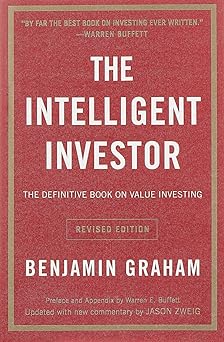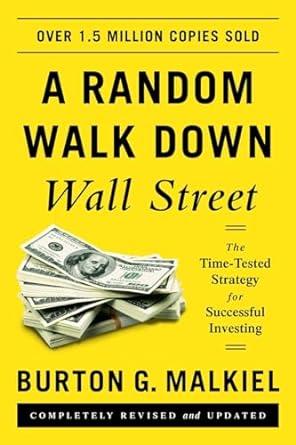Why stock market is important?
Understanding the stock market helps unlock most people’s financial opportunities and develops well-informed investment decisions. This market, officially called the stock market, is for buying and selling shares in publicly listed companies. Now, here is why it is one of the areas in finance that is worth learning. Read books on the Stock market. So we are providing you top 10 books for the stock market.
Top 10 Books for Stock Market
Below are the top 10 books for stock market, with the name of their titles, their authors, and a brief introduction and critical insights or lessons covered inside every book:
1. "The Intelligent Investor" by Benjamin Graham
Author: Benjamin Graham
Introduction: Known as the father of value investing, Graham’s book teaches fundamental principles like investing with a margin of safety and focusing on long-term strategies.
Key Insights: Importance of analyzing financial statements, understanding market cycles, and separating investing from speculation.
2. "A Random Walk Down Wall Street" by Burton G. Malkiel
Author: Burton G. Malkiel
Introduction: Malkiel discusses the efficient market hypothesis and advocates for passive investing through index funds, emphasizing the unpredictability of stock prices.
Key Insights: Benefits of diversification, pitfalls of trying to time the market, and the long-term advantages of low-cost investing.
3. "Common Stocks and Uncommon Profits" by Philip Fisher
Author: Philip Fisher
Introduction: Fisher focuses on qualitative analysis and understanding the quality of a company’s management and growth prospects.
Key Insights: Importance of conducting thorough research, investing in innovative companies, and holding stocks for the long term.
4. "One Up On Wall Street" by Peter Lynch
Author: Peter Lynch
Introduction: Lynch shares his experiences and insights as a successful mutual fund manager, emphasizing the value of individual investors using their knowledge to find winning stocks.
Key Insights: Investing in what you know, spotting emerging trends, and staying calm during market fluctuations.
5. "The Little Book That Still Beats the Market" by Joel Greenblatt
Author: Joel Greenblatt
Introduction: Greenblatt introduces the concept of “magic formula investing,” which combines value and quality metrics to identify high-performing stocks.
Key Insights: Simple investing principles, importance of consistency, and the power of compounding returns.
6. "How to Make Money in Stocks" by William J. O'Neil
Author: William J. O’Neil
Introduction: O’Neil outlines his CAN SLIM strategy for investing, focusing on stocks with strong earnings growth and technical price momentum.
Key Insights: Using charts for stock analysis, managing risk through stop-loss orders, and identifying market leaders.
7. "Reminiscences of a Stock Operator" by Edwin Lefèvre
Author: Edwin Lefèvre
Introduction: This is a fictionalized biography of Jesse Livermore, one of the greatest stock traders of all time, offering insights into market psychology and trading strategies.
Key Insights: Understanding market sentiment, managing emotions, and learning from both successes and failures.
8. "Market Wizards" by Jack D. Schwager
Author: Jack D. Schwager
Introduction: Schwager interviews top traders and investors to uncover their strategies and mindset for achieving success in the markets.
Key Insights: Importance of discipline and consistency, adapting strategies to changing market conditions, and learning from experienced professionals.
9. "Stocks for the Long Run" by Jeremy J. Siegel
Author: Jeremy J. Siegel
Introduction: Siegel provides a comprehensive analysis of historical market data and argues for the benefits of long-term investing in stocks as a wealth-building strategy.
Key Insights: Power of compounding returns over time, resilience of the stock market, and the impact of dividends on total returns.
10. "The Warren Buffett Way" by Robert G. Hagstrom
Author: Robert G. Hagstrom
Introduction: Hagstrom distills Buffett’s investment philosophy, focusing on value investing principles, business analysis, and the importance of a sustainable competitive advantage.
Key Insights: Investing in understandable businesses, patience in decision-making, and the importance of ethical behavior in investing.
These books offer valuable insights into various aspects of investing in the share market, from fundamental analysis and value investing to technical analysis and market psychology. They are essential reads for anyone looking to deepen their understanding of investing and improve their investment strategies.
Also read: Gift Nifty Live Tips And Tricks
Benefits of Learning from Books
1. Deep Learning
Another plus point for books is that they encompass details and much depth regarding information with certain subjects. About discussing concepts, theories, and the presentation of case studies, among others, books will usually dive more profound than any short article or video clip in that representation. This depth allows the reader to understand holistically otherwise tricky issues, such as the share market. The principles, historical tendencies, and practical applications are outlined in much greater detail than any shorter formats would allow.
2. Learning on a Book
Learning on a Book typically have a chapter arrangement and even subsections, which therefore puts content in a structured context. Readers using books have been compelled to put issues in an elaborate context, with a stepwise assimilation of concepts, from grassroots work still a point until the advanced, more sophisticated detail. There is always a consistent flow, starting from matters of fact toward more mature ideas.
3. Authoritative Insights
Owners of such expertise in knowledge hold reliability, being able to develop a high level of authority in the information they provide. Many books are written and authored by experts or practitioners with many years spent in the field. Authors more often pass on their insights and lessons learned, and practical tips based on the real-life situations that have passed their way. The valuable indeed for a reader aspiring to apply whatever theoretical knowledge is put to practical use in dealing in the share market.
4. Full Coverage Insurance
Books, by their nature, cover broad aspects of any one area of the subject. For example, a book on the share market may contain a dime-a-dozen topics such as investment and ways and means of it, risk management, studies of the market, or the prevalent economic factors that may influence the stock prices at any given time—all accommodated in one comprehensive volume. This presents readers a broad view of the subject and its different dimensions.
5. Reflective Learning
Reading books encourages reflective learning. A reader can stop, reflect, and go back over some paragraphs at any time. One can underline subtle material, note down information, and grasp what is being presented at their own pace in not more than three passes. The reflective process encourages better comprehension and knowledge retention, and that can be rapidly internalized as compared to passive sources of learning.
Ways to Select the Best Books for Stock Market
Some essential criteria have been made to select the top 10 books from the share market so that readers will not have much trouble and get maximum insights. These are easy to understand.
Clarity
The most careful effort was taken to choose books that are written clearly and that use clear, minimal jargon.
Relevance
Relevant books specifically aim to discuss current-based trends and strategies related to the share market all the time. They are involved in trending discussions and provide practical advice that readers could implement in the existing market run.
Show Grit
Suffice it to say that the authors have the proper credentials, having either a finance, investment, or economics background. Authors may also have years of first-hand experience in the share market or reputable positions in financial institutions. Suffice it to say, therefore, that firm information in the book is of expert advice or credibility.
Humanify
Chosen books do need to provide strategies or tips that are practically usable by the reader. They should give the knowledge of investing in the share market and empower readers to make informed decisions.
Conclusion
Within the share market, the lesson never stops, as the market is not only about buying and selling stocks but also about trends, analyzing companies, and making decisions based on that information. This will help you to keep in touch with the latest happening in the market, avoid likely common mistakes, and better your investment strategy.
Besides that, books are also an excellent way to take up in-depth studies into the world of the share market. They provide in-depth information from experts who have garnered years of hands-on experience. Through reading books associated with shares, a person can learn about different investment strategies, market psychology and insight into how successful investing works.











